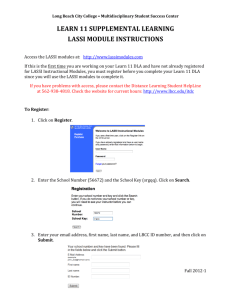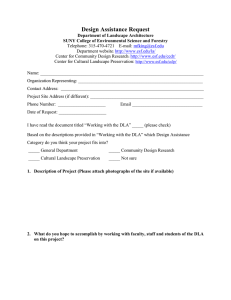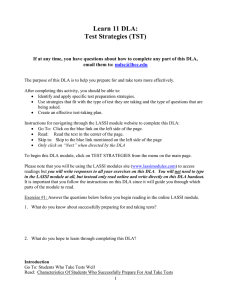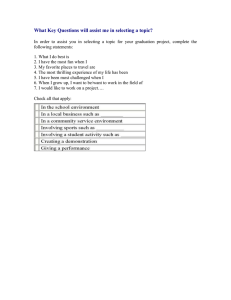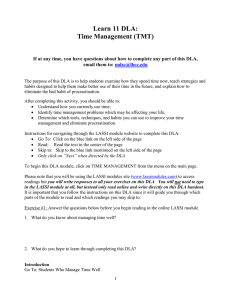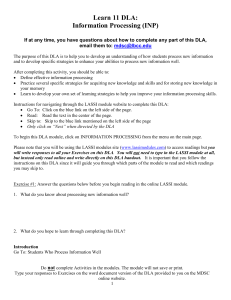SMI: Selecting Main Ideas
advertisement
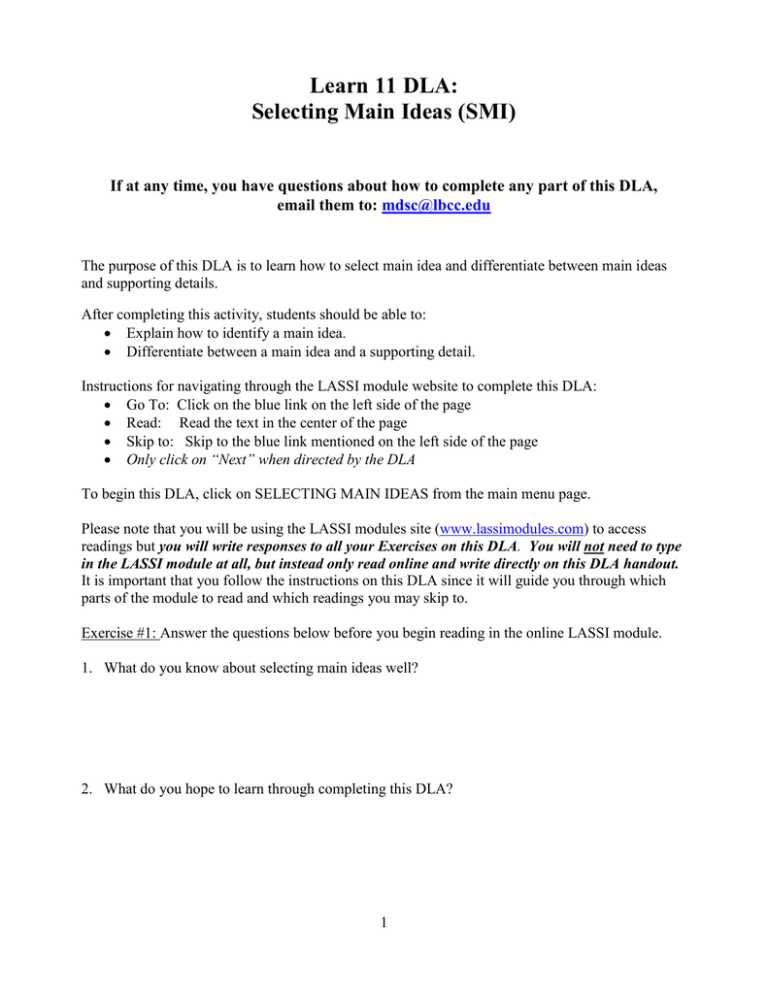
Learn 11 DLA: Selecting Main Ideas (SMI) If at any time, you have questions about how to complete any part of this DLA, email them to: mdsc@lbcc.edu The purpose of this DLA is to learn how to select main idea and differentiate between main ideas and supporting details. After completing this activity, students should be able to: Explain how to identify a main idea. Differentiate between a main idea and a supporting detail. Instructions for navigating through the LASSI module website to complete this DLA: Go To: Click on the blue link on the left side of the page Read: Read the text in the center of the page Skip to: Skip to the blue link mentioned on the left side of the page Only click on “Next” when directed by the DLA To begin this DLA, click on SELECTING MAIN IDEAS from the main menu page. Please note that you will be using the LASSI modules site (www.lassimodules.com) to access readings but you will write responses to all your Exercises on this DLA. You will not need to type in the LASSI module at all, but instead only read online and write directly on this DLA handout. It is important that you follow the instructions on this DLA since it will guide you through which parts of the module to read and which readings you may skip to. Exercise #1: Answer the questions below before you begin reading in the online LASSI module. 1. What do you know about selecting main ideas well? 2. What do you hope to learn through completing this DLA? 1 Introduction Go To: Students Who Select Main Ideas Well Read: Characteristics Of Students Who Select Main Ideas Well. Do not read the last paragraph. Go To: Learning From Research Read: What Research Tells Us About Students Who Select Main Ideas Well Go To: Learning From Research Read: What Research Tells Us About Students Who Do Not Select Main Ideas Well Exercise #2: Of the characteristics of students who select main ideas well and who do not select main ideas well you just read about, write three (3) that you identify with. 1. 2. 3. What is Selecting Main Ideas? Go To: Selecting Main Ideas Read: What Is Selecting Main Ideas? Go To: Questions To Guide Your Thinking Read: Questions To Guide Your Thinking As You Complete This Selecting Main Ideas Module Exercise #3: Answer the questions below by circling Yes, Sometimes, or No (circle Y, S, or N below). Explain each of your answers in the space provided. 1. Do you have trouble determining which information to study for tests? Explain: Y S N 2. Do you look for connections between main ideas and supporting details (the information that helps to explain a main idea)? Y S N Explain: Do not complete Activities in the modules. The module will not save or print. Type your responses to Exercises on the word document version of the DLA provided to you on the MDSC online website. 2 3. Do you ever focus too much on the details? Explain: Y S N 4. Have you ever read a book or heard a lecture and wondered, "What was the point of that?" Y S N Explain: 5. During a lecture, do you ever feel like what the instructor is saying is not making sense? Y S N Explain: 6. Do you ever have trouble concentrating in class or while reading because you can't make sense of the information? Y S N Explain: 7. Have you ever read the same text with different purposes (e.g., reading a book for fun versus for a class)? Y S N Explain: 8. (If you answered “Yes” or “Sometimes” on #7) Did you use different reading strategies for finding the important information for each purpose? Y S N Explain: 9. Do you pay attention to cues from the instructor or your textbook that might help you find the important information? Y S N Explain: Go To: Being Effective And Efficient Read: Selecting Important Information Helps You To Be Effective And Efficient Exercise #4: Answer the questions below with a Yes or No (circle Y or N below). Y N 1. Have you ever gone to an exam thinking that you were well prepared only to discover that the material you studied was not emphasized on the exam? Do not complete Activities in the modules. The module will not save or print. Type your responses to Exercises on the word document version of the DLA provided to you on the MDSC online website. 3 Y Y Y N 2. When you study for an exam, do you first decide what is most important to focus on and learn? N 3. Have you ever read a book and gotten one meaning from it, but then read the same book at a later time and gotten a completely different meaning from it? N 4. Have you ever had an instructor who wanted you to know the specific details of what you read? Go To: Important Points To Remember Read: Important Points To Remember About Selecting Main Ideas. Exercise #5: Answer the questions below in your own words. What is a main idea? What is a supporting detail? What is a topic? Factors That Affect Main Ideas Go To: Important Information Is Relative Read: Important Information Is Relative To Your Situation Go To: Factors That Influence What Is Important Read: Three Factors That Influence What Is Important Information Go To: Knowledge Of The Nature Of The Task (Activity #4) Read: Knowledge About The Nature Of The Academic Task. Do not complete Activity #4 online. Read material only. Answer the Exercise below. Exercise #6: Thinking about how tasks can differ based on the type of task it is and the instructor’s focus and subject, write answers to the following questions. How do you think the information that you choose to learn for a multiple-choice test might differ from the information that you choose to learn for an essay test? What is the important information to focus on for each style of test? Multiple Choice: Essay: Do not complete Activities in the modules. The module will not save or print. Type your responses to Exercises on the word document version of the DLA provided to you on the MDSC online website. 4 Harper Lee's novel To Kill a Mockingbird is a classic of twentieth century American literature. The story, which is set in a sleepy small Southern town during the Great Depression, chronicles a series of life-changing events that occur in the life of a young White girl named Scout Finch. The book's plot revolves around Scout's father, a prominent attorney, whose decision to defend in court a Black man charged with raping a White woman awakens deep-seated racial tensions in his community. How would your study of this novel in an English class differ from the study of it in a History class? How might these different academic disciplines affect what you focus on? English class: History Class: Click “Next” to read the answers to Activity #4 online and compare them to your responses to Exercise #6 you have just completed on this packet. Revise your responses as necessary after comparing to those in the reading. Click “Next” once more to continue reading the next page. Go To: Instructor Expectations (Activity #5) Read: Instructor Expectations. Do not complete Activity #5 online. Read material only. Answer the Exercise below. Exercise #7: Think about how your instructor's expectations influence the information that you choose to learn. Write your answer to the following question. How do instructors convey to you that they think certain information is particularly important? Do not complete Activities in the modules. The module will not save or print. Type your responses to Exercises on the word document version of the DLA provided to you on the MDSC online website. 5 Click “Next” to continue reading this topic. As you read, replace references to Activity #5 with Exercise #7. Compare your response to the responses in this reading. Are there 2 responses on this page that one of your former or current instructors uses to convey important information that you did not write in your answer above? If so, what are they? 1. 2. Click “Next” again to continue reading the next page, but don’t complete Activity #6 online. You will read the paragraphs below and write on this DLA. Exercise #8: Read the following paragraphs from the perspective of a student whose instructor focuses on the general ideas, and then answer the questions below. Using cognitive learning strategies involves the intentional manipulation of information by the learner through processes such as repetition, elaboration, or reorganization of the material in such a way that the new information is able to be stored in the learner's associative network and accessed for retrieval. Weinstein and her colleagues (Weinstein & Meyer, 1991) further defined cognitive learning strategies as including the following three critical characteristics: learning strategies are goal-directed, intentionally invoked, and effortful. In an early study in this area, Weinstein (1978) demonstrated that cognitive strategies could, in fact, be modified through instruction. After a 6-week training program, junior high school students improved their learning performance for both laboratory and everyday learning tasks. In the early 1980s, a large number of researchers began investigating the effectiveness of specific memory strategies, such as mnemonics and categorization strategies. Many of these studies, which examined the effectiveness of strategy use, were investigating strategies, which students had largely learned on their own. Several researchers also investigated how strategies spontaneously developed in children. Although it did seem that strategies could develop spontaneously, their development was dependent on students' exposure to effective models that provided opportunities for practice. However, many students did not have exposure to effective memory strategy use, and even when they did, not all students would take advantage of the information provided to them in their environment. 1. What do you think is the topic of these paragraphs? Do not complete Activities in the modules. The module will not save or print. Type your responses to Exercises on the word document version of the DLA provided to you on the MDSC online website. 6 2. What are the main ideas? Click “Next” to read the answers. As you read, replace references to Activity #6 with Exercise #8. 3. How did your answers compare to those you read on the module? Exercise #9: Re-read the paragraphs in Exercise #8 from the perspective of a student whose instructor focuses on the details. What would the main ideas be from this different type of instructor perspective? Click on “Next” twice to read the answers. Compare your responses and adjust your responses above if necessary. As you read, replace references to Activity #7 with Exercise #8. Go To: Section Summary (click in blue navigation section). Read: Summary Of The Factors That Affect Important Information Summary Go To and Read: Finding Main Idea Go To: Distinguishing Between Main Ideas And Details Read: Distinguishing Between The Main Ideas And Supporting Details Go To: Suggestions For Selecting Main Ideas Read: Suggestions For Improving Your Skills At Selecting Main Ideas Exercise #10: Choose one (1) suggestion from those you just read, identify in which class or situation it can help you this semester and explain how it can benefit you in finding important information. Suggestion: Which Class/Situation and how you can apply it?: Do not complete Activities in the modules. The module will not save or print. Type your responses to Exercises on the word document version of the DLA provided to you on the MDSC online website. 7 Go To: Good & Bad News About Selecting Main Ideas Read: Summary Of The Selecting Main Ideas Module Go To: Suggestions From Other Students Read: Suggestions From Other Students For Improving Your Skills At Selecting Main Ideas Exercise #11: Answer the questions below. Which one suggestion from the reading can you apply immediately to your life or to your coursework this semester? How you will apply this suggestion this semester? What did you learn about main ideas in this activity that you can apply now in your coursework? If your classmate asked you how to find main ideas in text, how would you explain this process? Congratulations! You have completed part of your supplemental learning assignment and have learned about how your attitudes can affect you as a student and how to create and revise goals. To receive credit for completing this assignment, you will participate in an online follow-up session with a Center staff member. Go to the “Follow-up Sessions” tab on the Multidisciplinary Student Success Center Online Supplemental Learning Assistance site: http://webenhanced.lbcc.edu/mdssc/SLA/ to learn how to schedule your online appointment with a Center staff member. Do not complete Activities in the modules. The module will not save or print. Type your responses to Exercises on the word document version of the DLA provided to you on the MDSC online website. 8
